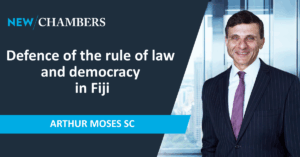
Arthur Moses SC appeared for the Fiji Law Society in a reference from the Cabinet of the Fiji Government to the Supreme Court of Fiji about the interpretation and application of the Fijian Constitution.
Following a coup in 2006, the President of Fiji abrogated the 1997 Constitution in 2009. In 2013, the President promulgated the 2013 Constitution. Since then, there have been three national elections and over 400 Acts enacted under the new Constitution.
Sections 159 and 160 (“the amendment provisions”) of the 2013 Constitution provides that the Constitution may be amended by a double supermajority with three-fourths of the members of Parliament and three-fourths of the registered voters at a referendum.
The principal issues before the Court involved: (1) whether the Court had jurisdiction to give an advisory opinion, (2) whether the 1997 Constitution or 2013 Constitution is recognised as the supreme law of Fiji, (3) what is the proper interpretation the amendment provisions, (4) whether the courts have the power to judicially review the amendment provisions, (5) whether the amendment provisions are unconstitutional or inoperative, and (6) what declarations or relief should the Court give.
In total, there were 11 parties (including intervenors and amicus curiae) who each made their own submissions and brought differing positions and perspectives. The hearing lasted for three days in Suva, Fiji and concluded on 20 August 2025. The hearing involved extensive submissions on complex issues, including in comparative jurisdictions and matters in international law. The case also required an analysis of the evidentiary material to test the assertion by the State that the impugned provisions made amendment to the 2013 Constitution “impossible”.
Mr Moses SC submitted that the 2013 Constitution met the common law test of efficacy and accordingly was the supreme law of Fiji. He submitted that there was no common law power for courts to judicially review original constitutional provisions. Mr Moses SC also submitted that it was not the role of the courts to rewrite the Constitution. He further argued that the State was erroneously inviting the Court to remove the current right of citizens to vote in a referendum on any constitutional amendments . This would transform the Constitution from a supreme law into a law that could be amended by a vote of 51% of members of Parliament. Importantly, he argued this would eradicate the concept of popular sovereignty from the Fiji Constitution.
Mr Moses SC was assisted by Professor Patrick Keyzer and Dane Luo, and instructed by the President of the Fiji Law Society, William (Wylie) Clarke from Howards Law. Professor Keyzer is the Professor of Law and Professor of Public Policy at the Australian Catholic University. Mr Luo is the Farthing Scholar in Administrative Law at Pembroke College at the University of Oxford, and was recently elected the Vinerian Scholarship Proxime Accessit for second best performance in the Bachelor of Civil Law.
The Court will publish its opinion before 5 September 2025.
Back to all